| Article Overview:
Climbing Mt. Everest or landing on the moon are achievements of great
historical and personal acclaim. But what if you did those
things and your name was swept into the shadows of history?
Would you be a victim of Historical Terrorism? Recently, a
15-year-old Sherpa girl climbed to the top of Mt. Everest, one of only
1,200 to achieve the goal over the past 50 years following Sir Edmund
Hillary and his climbing partner, Sherpa Tenzing Norgay.
Was her shadow swept into the pages of history? You decide. |
 VigilanceVoice VigilanceVoice
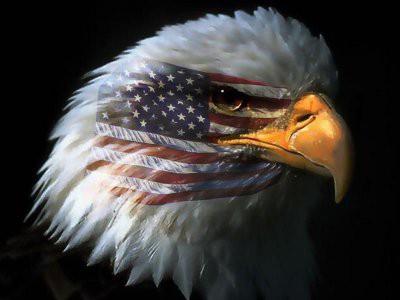
www.VigilanceVoice.com
Sunday--May
25, 2003—Ground Zero Plus 620
___________________________________________________________
Who's On First--Mt. Everest?
The Moon?
___________________________________________________________
by
Cliff McKenzie
Editor, New York City Combat Correspondent News
|
GROUND ZERO, New York City--I heard a rumor
that Buzz Aldrin was actually the first man on the moon.
The stories have it he slipped out to film his partner, Neil
Armstrong, take the first step on the moon and speak the famous words:
"That's one small step for man; one giant leap for mankind."
The legend has it Aldrin was first on the moon to record history, and
took his place as one of its shadow heroes. He, like many
in history, was the Gunga Din.
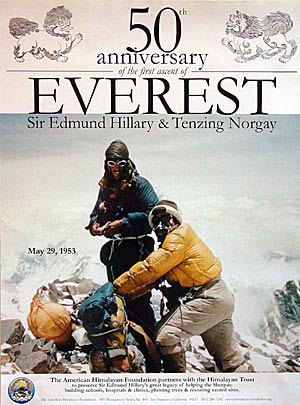 |
|
Who was the
first to climb Mount Everest? |
Sometimes, however, the servant is really the
master, even in fable.
Take the recent row over who was
really the first to climb Mt. Everest. Was it Sir Edmund
Hillary, the New Zealand beekeeper turner mountain climber who mounted
the peak of the world's largest peak on May 29, 1953, or, his
climbing partner, Sherpa Tenzing Norgay?
There's enough doubt to make heads
turn as the golden anniversary of climbing Mt. Everest draws to a peak
this coming week with a host of celebrations, including Sir Hillary,
now 83, attending special functions in Nepal honoring his alleged feat
of being first to the top of the 60 million-year-old mountain.
But there will be those who believe
they have been "Terrorized" by the shadow of the foreign climbers who
gain knighthood for their achievements while the Sherpa natives are
lucky to get their names mentioned, let alone remembered.
The flack is not unlike the
famous comedy routine between Bud Abbot and Lou Costello battling wits
over who was on first base. The confusion is the comedy,
but in this case, the confusion is also the shadow of the Beast of
Terror.
Today, the world struggles to
bring equality to the underprivileged. If we toss out the issue
of oil in Iraq, the war was fought to give the people of that nation
the freedom of equality over the tyranny of oppression. That was
the moral underpinning of all U.S. wars. Fighting for
fundamental freedoms and the equality that goes with them is one of
the hallmarks of American history. If one nation is known for
climbing the "Mt. Everest" of human equality, America certainly ranks
among the top contenders, willing to wage war in almost any part of
the world on the basis of freeing those whose freedoms have been
quashed. It also includes going to war within our own ranks for
the equality of American citizens.
On January 6, 1941,
President Franklin Delano Roosevelt delivered a speech to the 77th
Congress titled "The Four Freedoms"
(link to speech) following the attack on Pearl Harbor.
In it, he cited the four essential human freedoms. The
speech was, some claim, America's endorsement of fighting for the
rights of others anywhere in the world to enjoy these freedoms.
Here is a section of FDR's speech:
Excerpt From Four Freedom's Speech by FDR to 77th Congress, Jan. 6, 1941
In the future days which we seek to make secure, we look
forward to a world founded upon four essential human
freedoms.
The first is freedom of speech and expression --everywhere
in the world.
The second is freedom of every person to worship God in his
own way-- everywhere in the world.
The third is freedom from want, which, translated into world
terms, means economic understandings which will secure to
every nation a healthy peacetime life for its inhabitants
--everywhere in the world.
The fourth is freedom from fear, which, translated into
world terms, means a world-wide reduction of armaments to
such a point and in such a thorough fashion that no nation
will be in a position to commit an act of physical
aggression against any neighbor --anywhere in the world.
That is no vision of a distant millennium. It is a definite
basis for a kind of world attainable in our own time and
generation. That kind of world is the very antithesis of
the so-called "new order" of tyranny which the dictators
seek to create with the crash of a bomb. (link to speech) |
The four basic freedoms-- of religion, speech
and from want and fear--represent the sum of America's belief that no one is
a servant and no one has the right to be lord over others. And
while America has struggled internally, and is still struggling to
right its own moral ship, it still forays out into the world, bringing
the four freedoms to lands that may or may not want them.
The recent Mt. Everest battle is,
in part, about the equality of the Four Freedoms.. The Sherpas want what is only due--equal
recognition. But that may come only as an afterthought
rather than as an equal gift bestowed upon them as it is on others
from foreign lands.
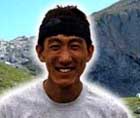 |
|
Ming Sherpa's
brother, Mingma Myalu |
Achievement seems to be
the most glorious and righteous way of correcting inequalities.
Just the other day the youngest of all Mt. Everest climbers stood on
the summit. She is Ming Kipa Sherpa, age 15.
Joining her at the top was her 30-year-old sister, Lahpka
Sherpa, the only person to have climbed the 8,848 meter-high mountain
three times, and her 24-year-old brother, Mingma Myalu.
Since the first climbers
placed their feet on Everest's summit in 1953, they have been followed by
1,200 others, including a legally blind climber, Erik Weihenmeyer, who
stood on the summit on May 25, 2001. One-hundred-and-seventy-five have died in the
attempt.
Mt. Everest, like
the moon landing, leaves open the question of who really was first,
and, also, why that is so important. Was Everest first conquered
by a Sherpa or a New Zealand beekeeper? Did Buzz Aldrin
slip out and take pictures of Neil Armstrong?
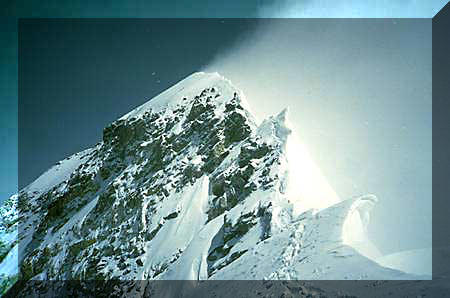
|
|
Snow flurries
at Hillary's Step on the South Summit of Mount Everest at 28,700
feet |
Today, the struggle for a world in which truth, peace and prosperity
rule seems a long, tortuous road compared to the potholes of Terrorism
that make every attempt to achieve it swerve out of control. Great
newspapers are being attacked for falsifying stories. Great
institutions of politics and religion are being attacked for their
internal defects. Great business icons, once the realm of
untouchable kings and queens of commerce, are being tainted by actions
that fall far below the expectations of their worshippers.
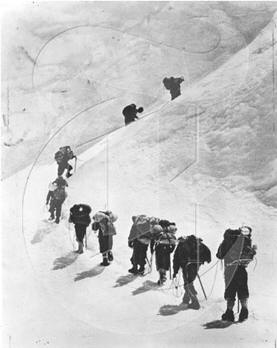 |
|
Sir Edmund
Hillary and fellow climbers going up Mount Everest in 1953 |
Summit meetings, such as the U.S. is attempting to have with North
Korea via China to limit the nuclear arms race, seems to be a scramble
over who can get to the top of the power heap fastest, and those who
lag behind want to keep their "nuclear ice picks" sharp so they can
still climb the international Mt. Everest of Power even if they are
small and tyrannical.
North Korea wants to join
those who have climbed the nuclear Mt. Everest summit and to thump its chest
with India, Pakistan, England, the U.S., France, Russia and Israel,
all of whom have the power to blow up mountains. It seems the
world wants to scream: "I am the king of the world!"
Then there is a
15-year-old girl, a Sherpa, who achieves an incredible feat of
climbing the world's highest and toughest mountain--receiving little
recognition.
While she faced
life and death danger, millions of Americans watched Annika Sorenstam
sweltering to try and climb the Mt. Everest of PGA golf, to break
through the "old boy's club" and join the "men at the top."
It may seem to some in contrast a matter of insignificance that Annika
was even put in front of a television camera while no one bothered to
track the climbing of Ming Kipa Sherpa in her adventure to conquer the
world's greatest mountain, rising 29,035 feet above sea level.
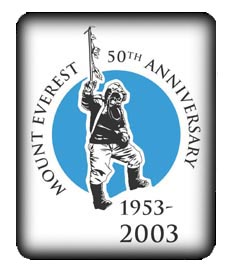
|
|
Ming Kipa
Sherpa is a Sentinel of Vigilance |
Perhaps there won't
be knighthood for any Sherpa who conquers Everest, but there is Sentinel of Vigilancehood.
We at the Vigilance
Voice honor all those who climb the great mountains, especially the
locals who live in the shadow of those from abroad and risk their
lives to offer others the fame and glory of achievement.
Let Ming Kipa
Sherpa, 15, be a Sentinel of Vigilance. Her Courage, Conviction
and Right Action for the Children's Children's Children is not
unnoticed. If there is a role model of achievement that
exceeds that of Annika's vainglorious attempt to become a
"man-golfer," let Ming Kipa's achievement of climbing Mt. Everest
shadow the golf tournament, and humble all those who think heroism is
hitting a ball around a course versus climbing a mountain that thrives
on killing those who make the attempt.
Let the Light
of Vigilance shine forever on Ming Kipa Sherpa.
Let the Four
Freedoms ring from the top of Mt. Everest, not from the greens of Ft.
Worth's Colonial Country Club.
May
24--110 Men Stalking Woman Of Terror
©2001
- 2004, VigilanceVoice.com, All rights reserved -
a ((HYYPE))
design

|
|
|